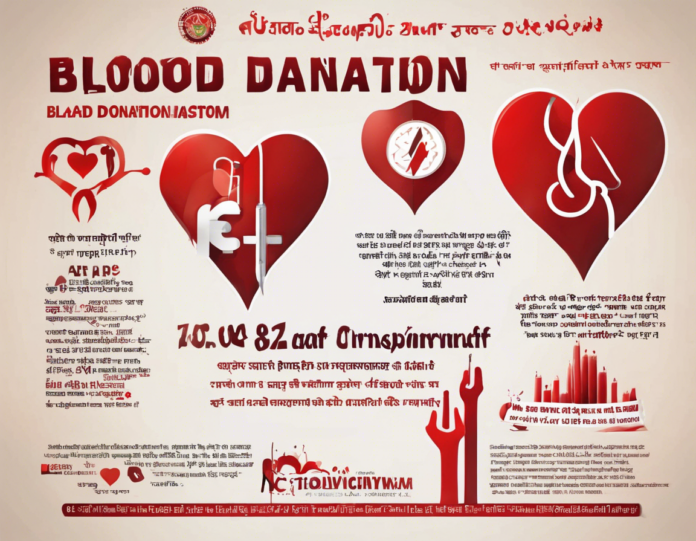Blood donation camps play a significant role in promoting community health by providing a crucial and life-saving resource. These events bring together volunteers who selflessly donate their blood to help those in need. In this blog post, we will discuss the importance of blood donation camps, the benefits of donating blood, how these events are organized, and some frequently asked questions regarding blood donation.
The Importance of Blood Donation Camps
Blood donation camps are essential for maintaining an adequate supply of blood for medical emergencies, surgeries, and other medical procedures. Blood is a precious resource that cannot be manufactured, and regular donations are crucial to ensure that hospitals have enough blood on hand to treat patients.
These camps also raise awareness about the importance of blood donation and encourage more people to become regular donors. By participating in these events, individuals can make a direct impact on the lives of those in need and contribute to their community’s well-being.
Benefits of Donating Blood
1. Saves Lives: Donating blood can save lives, especially in emergency situations such as accidents, surgeries, or medical conditions like anemia or cancer.
2. Health Benefits: Regular blood donation can reduce the risk of heart disease, improve blood flow, and lower cholesterol levels.
3. Free Health Check-up: Donors typically receive a free health check-up, including tests for blood pressure, hemoglobin levels, and infectious diseases. This can help individuals monitor their health regularly.
4. Sense of Fulfillment: Knowing that your blood donation can help someone in need can bring a sense of fulfillment and purpose to donors.
Organizing a Blood Donation Camp
Organizing a successful blood donation camp requires careful planning and coordination. Here are some key steps involved in setting up a camp:
1. Finding a Venue: Choose a convenient and accessible location for the camp, such as a community center, school, or office building.
2. Partnering with Blood Banks: Collaborate with local blood banks or healthcare organizations to ensure a safe and efficient donation process.
3. Promoting the Event: Use social media, posters, flyers, and local media to spread the word about the camp and encourage participation.
4. Setting Up Donation Stations: Arrange donation stations with trained medical staff, donation beds, and refreshments for donors.
5. Ensuring Safety and Hygiene: Follow strict safety protocols to maintain a clean and sanitary environment, including sterilizing equipment and practicing social distancing.
6. Providing Post-Donation Care: Offer snacks, drinks, and a rest area for donors to recover after donation, and provide information on post-donation care.
Frequently Asked Questions (FAQs)
Q1: Who can donate blood?
A: Most healthy adults aged 18-65 and weighing at least 110 pounds are eligible to donate blood. Some restrictions may apply based on medical history or travel to certain regions.
Q2: How often can I donate blood?
A: In most cases, donors can donate whole blood every 56 days (8 weeks) and platelets every 7 days.
Q3: Does donating blood hurt?
A: Donating blood is generally painless and takes about 10-15 minutes for the actual donation process.
Q4: Can I donate blood if I have a cold or flu?
A: It’s recommended to wait until you have fully recovered from an illness before donating blood to ensure the safety of both donors and recipients.
Q5: Are there any side effects of donating blood?
A: Some donors may experience minor side effects like dizziness, nausea, or bruising at the donation site, but these usually resolve quickly.
Q6: Can I donate blood if I have tattoos or piercings?
A: In most cases, individuals with tattoos or piercings can donate blood as long as the tattoo or piercing was done at a licensed facility and is fully healed.
Q7: Is it safe to donate blood during the COVID-19 pandemic?
A: Blood donation centers have implemented additional safety measures to prevent the spread of COVID-19, and it is safe to donate blood following these guidelines.
Q8: How is donated blood used?
A: Donated blood is used for various medical purposes, including surgeries, treatments for cancer patients, trauma care, and transfusions for individuals with blood disorders.
Q9: Can I donate blood if I am taking medication?
A: In most cases, taking medication does not disqualify someone from donating blood, but it’s essential to disclose all medications during the screening process.
Q10: Are there any long-term benefits of donating blood regularly?
A: Regular blood donation can help reduce the risk of certain health conditions, improve blood circulation, and promote overall well-being.
In conclusion, blood donation camps are a vital component of community health efforts, providing an essential resource for medical treatments and emergencies. By participating in these events and becoming regular blood donors, individuals can make a significant impact on the well-being of their community and help save lives. Consider organizing or participating in a blood donation camp to contribute to this noble cause and support those in need.

